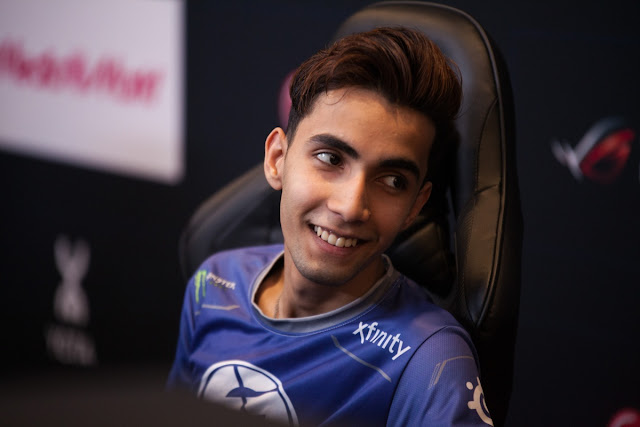PakAlumni Worldwide: The Global Social Network
The Global Social Network
Pakistan's Arslan Ash Siddique Wins ESPN's ESports Player of the Year Award 2019
Arslan Ash Siddique from Lahore, Pakistan has won three top ESports awards, including Player of the Year award for 2019, according to ESPN.com. In December awards, Aslan Ash won the Best Esports Player award under both the fan and ESPN choice categories. He was also the first-runner for Best Moment of the Year award in the fan poll. The nomination was based on his EVO wins.
Arslan Ash Siddique at EVO Japan 2019 |
Esports have risen to the level of other major international sports with multiple international tournaments. Esports leagues have sprung up in many countries including Pakistan. Esports Pakistan (ESPK) is a growing E-Gaming organization which organizes national esports competitions at its Gaming Arena at Royal Palm, Lahore.
Arslan put Pakistan on the esports map following his surprise first-place victory in Tekken 7 at EVO Japan 2019 and EVO 2019. Before October 2018, Ash, the Pakistani Tekken 7 phenom, had never competed in a major international tournament. Now, at the end of 2019, he is an international star and the only person to ever win the Evolution Championship Series Japan and its American counterpart in Las Vegas the same year.
Arslan is not the only successful Pakistani esports competitor on the world stage. Karachi-born Pakistani Syed Sumail Hasan, 19, is the world's youngest video gamer to surpass $1 million in earnings in esports. In fact, he has earned $3.6 million so far as an international Dota 2 player, ranking him the 10th biggest winner in the world, according to esportsearnings.com website which tracks players' earnings. Sumail started playing Dota 2 at the age of 7. He now lives in a Chicago suburb as a permanent resident of the United States.
Syed Sumail Hassan |
Arsalan Ash Siddique, 23 years old player from Lahore, Pakistan, caused a stir in Fukuoka Japan when he defeated world's top players to win EVO championship in February, 2019, according to Asahi Shimbun. In his victory speech, Arslan acknowledged many unknown Pakistani players who are also quite strong but could not join the competition because they could not get the visa to travel to Japan.
It wasn't easy for Arsalan to reach Japan to participate in the contest. He had to jump through many hoops and travel through several transit countries each of which made it difficult for him. When he arrived at Haneda airport in Japan, he only had Pakistani rupees and no exchange would accept them. Hungry and tired he tried his luck at the food court but no one would accept the Pakistani currency. His next flight was from Narita airport an hour away by public transport. To travel he needed to buy a ticket but did not possess any local currency, according to SBS Urdu.
Arsalan Ash Siddique (Center) |
Arsalan was exhausted and ready to give up his dream when he finally got through to his Japanese sponsors who helped him out. Needless to say he got no help from Pakistani diplomats through his challenging journey.
In spite of visa denials and other travel challenges faced by Pakistani players, the country ranks 25th in the world for players' earnings in 2019, according to esportsearnings.com. Ranked above Pakistan are mainly rich industrialized nations from North America, Europe and East Asia. All South Asian nations rank below Pakistan. Players from India rank 63rd, Sri Lanka 98th, Afghanistan 108th, Bangladesh 115th and Nepal 123rd.
Related Links:
Pakistani Esports Player Among World's Top Earners
Mobile Game Industry in Pakistan
Pakistani Investors: Invest in Local Tech Startups
Invest in Pakistan Summit in Silicon Valley
Upwardly Mobile Pakistani-Americans
-
Comment by Riaz Haq on February 4, 2020 at 4:39pm
-
#Pakistani game developers denied #US visa for #GDC #SanFrancisco make a game about it. Goal is to draw attention to issues faced by those attempting to travel into United States from #Muslim countries. Rejections way up during #Trump admin https://www.polygon.com/2020/2/4/21122459/pakistani-gdc-visa-denied... via @Polygon
Two game developers from Pakistan who were denied U.S. visas to attend the Game Developers Conference (GDC) in San Francisco have made a game about their experience. The stated goal is to draw attention to issues faced by those attempting to travel into the United States from Muslim countries. Restrictions have been on the rise since the election of President Donald Trump in 2016.
Trying to Fly was created as part of the Global Game Jam, which took place Jan. 31 to Feb. 2, by Bisma Zia, Anam Sajid, and Ali Hamza. Both Zia and Sajid had previously been awarded scholarships by the Independent Game Developers Association (IGDA) to attend GDC. But, when they applied for visas to enter the U.S. for GDC in March, they were denied. Similar stories have played out over the past few years, impacting residents of Iran, Syria, and other predominantly Muslim countries.
“They wanted to make a game that would highlight their (and others) experience at the Visa interview process,” reads the game description, “and how such measures can directly have an effect on their future careers and lives. The bird represents the applicants dreams and aspirations for the future.”
The IGDA has made great strides in the past decade to support fledgling game developers around the world. Pakistan represents an emerging new territory for gaming, due in part to its surging middle class and the adoption of mobile technology. It’s also home to the Pixelart Games Academy, Pakistan’s first games academy.
The same weekend that the Global Game Jam kicked off, the Trump administration announced it would expand its travel restrictions in 2020. Myanmar, Eritrea, Kyrgyzstan, Nigeria, Sudan, and Tanzania will all have new restrictions put in place regarding access to visas.
-
Comment by Riaz Haq on February 6, 2020 at 11:02am
-
#US #military likes violent #videogames. Over the past two decades, virtual games have had a dramatic effect on the military’s #education and #training programs, with the US Department of Defense spending US$4 billion annually. #Warfare https://theconversation.com/its-no-wonder-the-military-likes-violen... via @ConversationUK
For some time now, the military has been using these games to train combat soldiers. Already in 1997, a US Marine General recognised that virtual games operate both on the body and mind and improve a soldier’s preparedness for combat. Consequently, he sent out a directive allowing the use of computer-based war games when training infantry troops for warfare.
Over the past two decades, virtual games have had a dramatic effect on the military’s education and training programs, with the US Department of Defense spending US$4 billion annually to develop and integrate computerised war games into the curriculum of every war college in the US. These games prepare cadets for battle by simulating the use of automated weapons.
In fact, a recent recruitment drive by the British Army targeted gamers, with one of their posters reading: “Are you a binge gamer? The Army needs you and your drive.”
The goal of the military is to vanquish its enemies using violence. But what happens when the same training platforms migrate into our homes? And how do they affect the citizens who use them daily?
Home schooling
First-person shooter games have become permanent fixtures in the private sphere, allowing millions of citizens across the globe to participate in virtual wars from the comfort of their living rooms. Indeed, around 2.2 billion gamers regularly sit at home, many playing action-packed war games, which fuse virtual boot camps with special operations aimed at eliminating enemies.
Read more: Fortnite World Cup and the rise of the esports industry
A 2015 report suggests that in the US alone, 80% of households have a gaming device and over 155m citizens play games, many of which are extremely violent. And unlike the passive consumption of other forms of violent entertainment, such as television or movies, participants in these games assume an active role. The games invite citizens, many of whom are children, to step through the screen and become virtual protagonists in the exercise of violence.
In fact, there is a striking resemblance between the games on our children’s computers and the real operation of automated weapon systems using networked information and technologies to annihilate targets, which are often located thousands of miles away, in places like Pakistan, Yemen and Iraq.
Describing the use of computer simulations in the military, Michael Macedonia from the US Army Simulation Training and Instrumentation Command explained in an article that it “proved to be a smooth transition for younger generations of soldiers, who, after all, were spoon fed on Nintendo and computer games”.
-
Comment by Riaz Haq on December 31, 2022 at 12:51pm
-
How Islam helped Pakistan become an esports hub
DEVIN NEALY 5:47 AM SAT DEC 31, 2022
https://boingboing.net/2022/12/31/how-islam-helped-pakistan-become-...
Fighting games helped establish the world of esports. Before League of Legends and Starcraft even had a tournament presence, Street Fighter 3: Third Strike was taking the internet by storm with EVO moment 37. However, in the realm of competitive fighting games, there are few games as difficult as Tekken. Since Tekken is played in three dimensions, as opposed to the traditional two dimensions, there are numerous eventualities to account for during play. In addition to the three-dimensional chaos, almost every character in the game has a hundred moves that both you and your opponent must be aware of.
For decades, the country of South Korea has been the undisputed king of Tekken. With a host of notable players throughout the game's competitive history coming from South Korea, the country has long been established as the most dominant Tekken scene on Earth.
In the last few years, Pakistan has not only been making waves in the Tekken scene, but it's also working to usurp South Korea from its throne. In the video linked above, you can learn how the Islamic ritual of Hajj helped bring Tekken to Pakistan.
-
Comment by Riaz Haq on December 31, 2022 at 1:15pm
-
There have been 357 Pakistani esports players that have been awarded a total of $5,329,360.58 USD in prize money across 315 tournaments. The highest awarding game was Dota 2 with $4,522,888.59 USD won, making up 84.87% of all earnings by Pakistani players. Sumail "SumaiL" Hassan is the highest earning Pakistani player with $3,880,289.31 USD in prize money won overall, all of which was won from playing in Dota 2 tournaments.
https://www.esportsearnings.com/countries/pk#:~:text=There%20have%2....
Comment
Twitter Feed
Live Traffic Feed
Sponsored Links
South Asia Investor Review
Investor Information Blog
Haq's Musings
Riaz Haq's Current Affairs Blog
Please Bookmark This Page!
Blog Posts
IMF Questions Modi's GDP Data: Is India's Economy Half the Size of the Official Claim?
The Indian government reported faster-than-expected GDP growth of 8.2% for the September quarter. It came as a surprise to many economists who were expecting a slowdown based on the recent high-frequency indicators such as consumer goods sales and durable goods production, as well as two-wheeler sales. At the same time, The International Monetary Fund expressed doubts about the Indian government's GDP data. …
ContinuePosted by Riaz Haq on November 30, 2025 at 11:30am
Retail Investor Growth Driving Pakistan's Bull Market
Pakistan's benchmark index KSE-100 has soared nearly 40% so far in 2025, becoming Asia's best performing market, thanks largely to phenomenal growth of retail investors. About 36,000 new trading accounts in the South Asian country were opened in the September quarter, compared to 23,600 new registrations just three months ago, according to Topline Securities, a brokerage house in Pakistan. Broad and deep participation in capital markets is essential for economic growth and wealth…
ContinuePosted by Riaz Haq on November 24, 2025 at 2:05pm
© 2025 Created by Riaz Haq.
Powered by
![]()



You need to be a member of PakAlumni Worldwide: The Global Social Network to add comments!
Join PakAlumni Worldwide: The Global Social Network